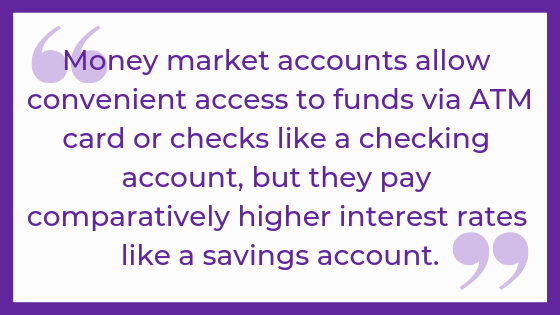Here’s a quick banking riddle:
Q: If a checking account is for writing checks and using a debit card for everyday needs and a savings account is for building cash savings, what purpose does a money market account serve?
Are you stumped? Drawing a blank? Can’t put your finger on it? The answer is simpler than you might think!
A: Money market accounts are a hybrid of checking and savings accounts and offer a number of attractive benefits to savers of all ages. They combine the best features of both!
How do checking, savings and money market accounts differ?
Checking accounts are known for their easy accessibility. To access the funds in a checking account, the accountholder simply uses a debit card at the point of sale, at an ATM, or writes a check on the account. A checking account usually pays a nominal interest rate unless the account balance is quite large. FDIC insurance is available for checking accounts up to the stated limits per accountholder.
Savings accounts are known for their comparatively higher interest rates and stricter withdrawal provisions – only six transfers or withdrawals are allowed each statement cycle and sometimes a minimum balance is required to maintain the account’s benefits and keep service fees low. FDIC insurance is also available for savings accounts up to the stated limits per accountholder.

Money market accounts combine the best of both worlds – they allow convenient access to the funds via ATM card or checks like a checking account, but they pay comparatively higher interest rates like a savings account. FDIC insurance is also available for money market accounts up to the stated limits per accountholder.
However, money market accounts may require a minimum initial deposit and should not be used as a daily account. Don’t cancel your checking account just yet – the six transfers or withdrawals limit per statement cycle rule still applies to money market accounts.
When is a money market account the right choice?
Money market accounts are ideal for a cash emergency fund, which every adult should maintain or be saving towards. (I recommend saving three months’ of your + your spouse/partner’s wages/salary before taxes if you are in a two-earner household or saving six months’ of wages/salary before taxes if you are the sole earner in your household).
Money market accounts are also a smart choice if you have a major expense planned in the short-term and your goal is to maximize the interest-earning potential without facing risk of loss (as compared to investing the funds in the stock market).
Finally, money market accounts differ from money market mutual funds, which are often used in investment/stock accounts as a cash equivalent. Money market mutual funds do not enjoy FDIC insurance benefits like money market accounts with a Bank do (up to stated limits per accountholder).








 Equal Housing Lender. SBA Preferred Lender. NMLS #440379
Equal Housing Lender. SBA Preferred Lender. NMLS #440379